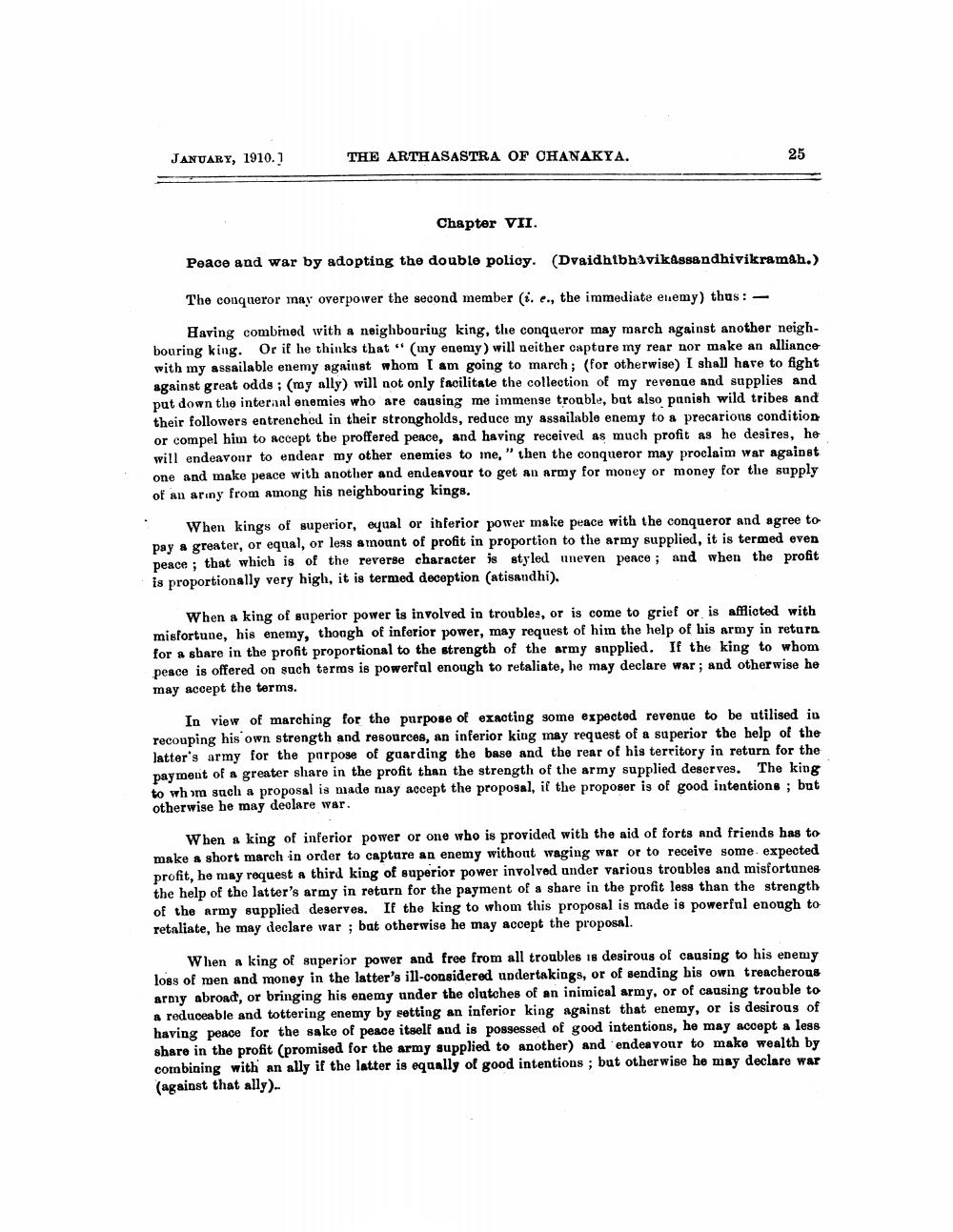________________
JANUARY, 1910.1
THE ARTHASASTRA OF CHANAKYA.
Chapter VII.
Peace and war by adopting the double polioy. (DvaidhibhavikAssandhivikramah.)
The conqueror may overpower the second member (6. e., the immediate enemy) thus: -
Having combined with a neighbouring king, the conqueror may march against another neighbouring king. Or if he thinks that " (my enemy) will neither capture my rear nor make an alliance with my assailable enemy against whom I am going to march ; (for otherwise) I shall have to fight against great odds : (my ally) will not only facilitate the collection of my revenue and supplies and put down the internal enemies who are causing me immense trouble, but also panish wild tribes and their followers entrenched in their strongholds, reduce my assailable enemy to a precarione condition or compel him to accept the proffered peace, and having received as much profit as he desires, he will endeavour to endear my other enemies to me," then the conqueror may proclaim war against one and make peace with another and endeavour to get an army for money or money for the supply of an aring from among his neighbouring kings.
When kings of superior, equal or inferior power make peace with the conqueror and agree to pay a greater, or equal, or less amount of profit in proportion to the army supplied, it is termed even peace; that which is of the reverse character is styled uneven peace; and when the profit is proportionally very high, it is termed deception (atisandhi).
When a king of superior power is involved in troubles, or is come to grief or is afflicted with misfortune, his enemy, though of inferior power, may request of him the help of his army in return for a share in the profit proportional to the strength of the army supplied. If the king to whom peace is offered on such terms is powerful enough to retaliate, he may declare war; and otherwise he may accept the terms.
In view of marching for the purpose of exacting some expected revenue to be utilised in recouping his own strength and resources, an inferior king may request of a superior the help of the latter's army for the porpose of guarding the base and the rear of his territory in return for the payment of a greater share in the profit than the strength of the army supplied deserves. The king to whom such a proposal is made may accept the proposal, if the proposer is of good intentions ; but otherwise he may deolare war.
When a king of inferior power or one who is provided with the aid of forts and friends has to make a short march in order to capture an enemy without waging war or to receive some expected profit, he may request a third king of superior power involved under various troubles and misfortunes the help of the latter's army in return for the payment of a share in the profit less than the strength of the army supplied deserves. If the king to whom this proposal is made is powerful enough to retaliate, he may declare war ; bat otherwise he may accept the proposal.
When a king of superior power and free from all troubles is desirous of causing to his enemy loss of men and money in the latter's ill-considered undertakings, or of sending his own treacherous army abroad, or bringing his enemy under the clutches of an inimical army, or of causing trouble to a reduceable and tottering enemy by setting an inferior king against that enemy, or is desirous of having peace for the sake of peace itself and is possessed of good intentions, he may accept a less share in the profit (promised for the army supplied to another) and endeavour to make wealth by combining with an ally if the latter is equally of good intentions ; but otherwise he may declare war (against that ally).




